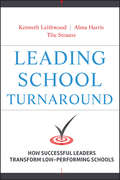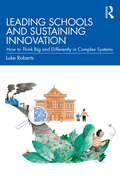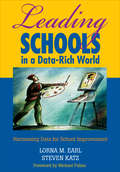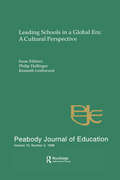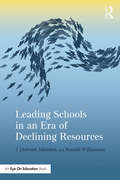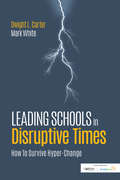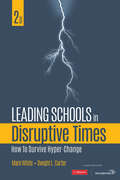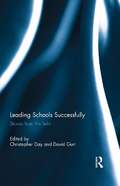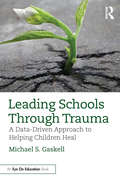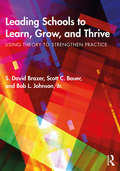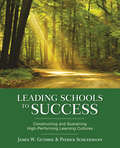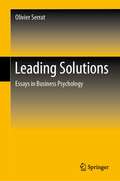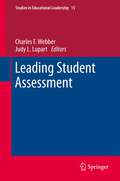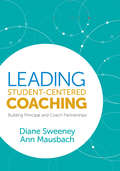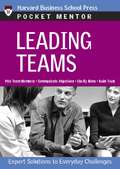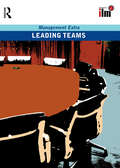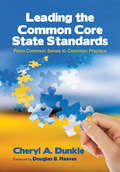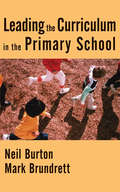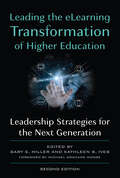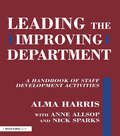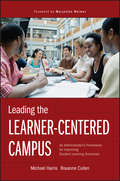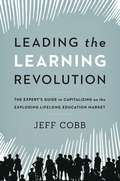- Table View
- List View
Leading School Turnaround
by Alma Harris Tiiu Strauss Kenneth LeithwoodPraise for Leading School Turnaround"Going beyond their previous considerable work on the study of leadership, Kenneth Leithwood, Alma Harris, and Tiiu Strauss now get up-close and detailed. They use their powerful framework for how school leaders influence student learning, but this time they get inside the 'how.' Practical, powerful, interesting, and insightful-an indispensible resource for turnaround leaders."-Michael Fullan, professor emeritus, Ontario Institute for Studies in Education at the University of Toronto"The problem of bringing about change in those schools where it is needed most remains one of the most intractable challenges in school leadership. This book is written by international scholars who understand the complexities of this challenge. Unlike other volumes based on a single person's experience or a reading of the literature, these authors offer useful specific insights based on data about what leaders in schools that accomplish fundamental change actually do."-Philip Hallinger, Chair Professor of Leadership and Change, Hong Kong Institute of Education
Leading Schools and Sustaining Innovation: How to Think Big and Differently in Complex Systems
by Luke RobertsHow can school leaders analyse and meaningfully engage in the complex process of change? Offering an innovative introduction to the challenges of school leadership from the perspective of systems, this essential staff-room companion shows why school leaders now need to think and engage as system leaders more than ever before. Luke Roberts explores what types of systems can be most effectively implemented and provides cutting-edge ideas on what school leaders can do to embed and genuinely sustain innovation. He also presents a framework based on understanding different stakeholder views and shows how to facilitate process to gain new perspectives and enthuse the whole school community. This accessible resource focuses on the application, to enable readers to use their understanding of creativity and innovation to transform systems. He provides examples from research successfully conducted in schools as well as the lived experiences of working to change schools. He also helpfully provides a simple route to engaging with system thinking, asking what this means for the reader and the specific challenges they face. Leading Schools and Sustaining Innovation will appeal to educationalists across the whole educational sector, including head teachers, policy leaders as well as staff working towards and passionate about school improvement and transformation.
Leading Schools in a Data-Rich World: Harnessing Data for School Improvement
by Lorna M. Earl Steven KatzTurn skepticism about data into knowledge for true educational reform! More versatile than mere number crunching and statistics, data can be an effective tool—or even a powerful catalyst—for change within a school. Lorna M. Earl and Steven Katz show educators how to become comfortable with data, and provide valuable tools that school leaders and school improvement teams can use in their work, including: Vignettes to support group discussion Activities to give readers a chance to practice ideas and concepts Task sheets Short case studies that show how the full process works
Leading Schools in a Global Era: A Cultural Perspective: A Special Issue of the Peabody Journal of Education
by Philip Hallinger Kenneth LeithwoodThis special issue looks at the constantly changing face of education in the world today. Topics covered include educational values, cross-cultural studies, leadership, social impacts, and the role of technology in education.
Leading Schools in an Era of Declining Resources
by J. Howard Johnston Ronald WilliamsonEvery day, school leaders across the country are having to make difficult decisions in this economically demanding environment. If you are a leader facing this challenge in your own school or district, this is the book you need! Experienced educators Johnston and Williamson offer practical advice to help you tackle a variety of tough issues, including staff reductions and program termination. You’ll learn how to… Wring every bit of performance out of every available dollar Plan innovations and evaluate their effectiveness Engage faculty and the community Streamline operations using digital technology and social media Use four strategies—reduce, refine, restructure, and regenerate—to make your school more efficient and effective Each chapter is filled with tips, tools, exercises, and mini-cases to help you apply these ideas to your own situation. You’ll gain the confidence and knowledge to manage your budget while ensuring your students get the full benefit of a quality education.
Leading Schools in Disruptive Times: How To Survive Hyper-Change
by Dwight L. Carter Mark E. WhiteA school leadership model for surviving hyper-change From social media to evolving safety issues to constant school reform, today&’s school leaders face unprecedented disruption. How can educators prepare students for a globalized world when many institutions are not ready for the constantly changing 21st century? With an eye on the past and a vision for the future, Carter and White draw the blueprint for adapting schools to ever-changing times. • A comprehensive history of disruption in American schools as a lens for understanding accelerated change • Practical exercises and real-life examples for reshaping education in the 21st century • A grounded examination of radical disruptions schools will face in the years to come
Leading Schools in Disruptive Times: How To Survive Hyper-Change
by Dwight L. Carter Mark E. WhiteA school leadership model for surviving hyper-change From social media to evolving safety issues to constant school reform, today’s school leaders face unprecedented disruption. How can educators prepare students for a globalized world when many institutions are not ready for the constantly changing 21st century? With an eye on the past and a vision for the future, Carter and White draw the blueprint for adapting schools to ever-changing times. • A comprehensive history of disruption in American schools as a lens for understanding accelerated change • Practical exercises and real-life examples for reshaping education in the 21st century • A grounded examination of radical disruptions schools will face in the years to come
Leading Schools in Disruptive Times: How to Survive Hyper-Change
by Mark E. White Dwight L. CarterFrom surviving to thriving during constant disruption The updated edition of this handbook couldn’t have come at a better time. Focusing on lessons learned from the disruptions of 2020, including the COVID school closures and the renewed pursuit of social justice, the authors show school leaders how to prepare for and respond to disruptions that are leading to a "new normal." Educators are racing to stay ahead of pandemic-scale disruptions and need a blueprint for transformation. This book will walk you through the decision-making process so you’ll be able to transform as a leader to confront the issues you’ll face in the 2020s. Features include: • Practical strategies for identifying and responding to disruptions • An overview of the CAT framework: coping, adjusting, transforming • Real-life stories from exceptional educational leaders • Tips on guiding teachers, staff, and students through the many lessons learned during the pandemic • Activities, scenarios, and practical actions to lead through complex topics that include remote learning, social justice issues, education reforms, generational differences, and social media issues The pandemic has been the biggest disruption in school history, and this will be a decade of monumental change for schools. Your stakeholders will look to you to guide them—and this book gives you the tools you need to have the mindset and practical steps to be successful in an ever-changing world.
Leading Schools in Disruptive Times: How to Survive Hyper-Change
by Mark E. White Dwight L. CarterFrom surviving to thriving during constant disruption The updated edition of this handbook couldn’t have come at a better time. Focusing on lessons learned from the disruptions of 2020, including the COVID school closures and the renewed pursuit of social justice, the authors show school leaders how to prepare for and respond to disruptions that are leading to a "new normal." Educators are racing to stay ahead of pandemic-scale disruptions and need a blueprint for transformation. This book will walk you through the decision-making process so you’ll be able to transform as a leader to confront the issues you’ll face in the 2020s. Features include: • Practical strategies for identifying and responding to disruptions • An overview of the CAT framework: coping, adjusting, transforming • Real-life stories from exceptional educational leaders • Tips on guiding teachers, staff, and students through the many lessons learned during the pandemic • Activities, scenarios, and practical actions to lead through complex topics that include remote learning, social justice issues, education reforms, generational differences, and social media issues The pandemic has been the biggest disruption in school history, and this will be a decade of monumental change for schools. Your stakeholders will look to you to guide them—and this book gives you the tools you need to have the mindset and practical steps to be successful in an ever-changing world.
Leading Schools Successfully: Stories from the field
by Christopher Day and David GurrLeading Schools Successfully: Stories from the field considers international research focussing on leadership in schools. Based on the ISSPP (International Successful School Principalship Project) which has conducted over one hundred multiple perspective case studies of successful school principals from more than a dozen countries, the book captures the exhilaration of being a principal who grows and sustains success from those practitioners who are acknowledged as exhibiting outstanding leadership. Whilst much is known about successful school leaders, the book reinforces the argument that it is neither possible, nor appropriate, to generalise specific strategies that should be adopted to ensure success for all schools at all times in all settings. Instead, success calls for a high level of judgement, wisdom, artistry and sheer hard work on the part of principals, adapting for their particular context the knowledge about leading schools successfully. Reflection sections in each chapter ask the reader to consider further issues which each chapter raises. Topics considered include: - the importance of school principals to school success - turning around under-performing schools - values-led leadership -sustaining successful leadership - leading in multi-cultural settings - issues and implications for the future. With international contributions from experts in the field, the book offers a new perspective on leadership in schools and will be of interest to school principals and researchers.
Leading Schools Through Trauma: A Data-Driven Approach to Helping Children Heal
by Michael S. GaskellLeading Schools Through Trauma is a data-driven resource for education leaders and administrators preparing to help students heal from acute traumas. Traumatizing experiences are inevitable and cyclical, and we see them at individual, local and large-scale levels. As a school leader you need concrete tools to help learners flourish in their wake, especially amid the challenges of our current moment. This book offers a strategic approach to sustaining community wellness and stability, using real-time, short-term data sets accessible to teachers, and guiding students toward incremental, progressive goal-setting. Evidence-based practices for recognizing traumas, scaling formative assessments and providing teachers with problem-based professional development will help you and your staff develop growth plans that are collaborative with and individualized for students.
Leading Schools to Learn, Grow, and Thrive: Using Theory to Strengthen Practice
by S. David Brazer Scott C. Bauer Bob L. Johnson Jr.Leading Schools to Learn, Grow, and Thrive provides a unique approach to preparing prospective education leaders by combining theory, research, and practice. Grounded in organizational and leadership theory, this book helps leaders understand their schools and districts from multiple perspectives and develop their own leadership aspirations, approaches, and missions. Well-known authors Brazer, Bauer, and Johnson present authentic practical problems, illuminate them with appropriate theory and research, and give readers opportunities to solve common puzzles as a means to grow wisdom about how to lead, especially when confronted with complex challenges. This book is an invaluable resource for aspiring leaders, one that readers will reference as they proceed through their leadership coursework and keep close at hand throughout their leadership career. Special Features: Vignettes—introduce the reader to real-life dilemmas that impact teaching and learning and provide a central reference point for discussions of theory, research, and practice. Theory and Research—frameworks and examples inform common leadership challenges, helping readers expand their knowledge and experience base to explore situations similar to their own contexts. Puzzles—real-world situations test knowledge and provide opportunities to practice ideas for effective leadership. Thought Partner Discussions (TPCs) and Extended Web Activities (EWAs)—additional thought activities, opportunities for reflection, and suggestions for discussion provoke puzzle solving. eResources—complementary resources for instructors and students, including a set of authentic role-playing scenarios.
Leading Schools to Success: Constructing and Sustaining High-Performing Learning Cultures
by James W. Guthrie Patrick J. SchuermannWhat's missing in education reform in the United States? The answer is leadership; specifically, the ability of school and district leaders to construct and continually nurture a culture of sustained high performance. A true leader needs to have not only a vision of the desired culture, but the skills and information necessary to make that vision a reality. Providing a combined 70 years of classroom and administrative experience, renowned authors James Guthrie and Patrick Schuermann offer a practice-based approach, grounded in research and theory, to achieving and maintaining an atmosphere of success in schools through effective leadership.
Leading Solutions: Essays in Business Psychology
by Olivier SerratThis book on business psychology—particularly organizational leadership—crosses industries, continents, and business environments: it includes 45 précis on emerging theories of leadership; ethical and cultural considerations; group and team leadership; leadership self-development; management philosophy and practice; organizational diagnosis and cultural dynamics; personality and lifespan in the workplace; professional development; qualitative research methods; psychological, socio-cultural, and political dimensions of organizations; the role of technology in organizations; strategic change management; and systems theory. The material ranges widely but is pithy: each précis offers in easy bites the latest "take" on the subject, drawing from popular textbooks, recommended readings, case studies, group exercises, personal experience, and self-reflection; each was written as a key to understanding and change with an eye to re-imagining leadership in the 21st century. Both rigorously researched and entertaining, this book addresses the fast-changing realities of organizational leadership in domestic and international settings across the private, public, and nonprofit sectors: it will serve as a valuable quick-access resource for practitioners and students.
Leading Student Assessment
by Judy L. Lupart Charles F. WebberThis book presents a new and refreshing look at student assessment from the perspective of leading educational theorists, researchers, and practitioners. The authors call for boundary-breaking assessment that reflects clear understandings of the purposes of assessment, a balance of assessment creativity and realism, the ability to detect solutions for assessment challenges, and the capacity to question and imagine assessment alternatives. The 14 chapters offer school and district educators, policy makers, researchers, and university teacher preparation faculty with a comprehensive, current overview of the state and art of student assessment. Key questions are posed about assessment and critical challenges are presented along with sound evidence-based solutions. Student assessment is analyzed in terms of its relationship with classroom instructional practices and large-scale testing programs. Formative and summative assessments are compared and contrasted. The role of psychological assessment in informing classroom practices is profiled along with the need for student voice in fair assessment practices. Readers will be challenged to consider the ecology of student assessment, that is, the impact of assessment in classrooms and schools through to the macro level of globalized societies. The underpinning values and assumptions of student assessment are highlighted. Finally, a rationale is offered for reconceptualizing and redefining assessment.
Leading Student-Centered Coaching: Building Principal and Coach Partnerships
by Diane Sweeney Ann MausbachEssential leadership moves for supporting instructional coaching in your school Strong leadership is essential in any successful instructional coaching effort. Leading Student-Centered Coaching provides principals and district leaders with the background, practices, and tools required for leading coaching efforts that have a profound and positive impact on student and teacher learning. Filled with practical ideas that school leaders can easily apply to their own school settings, this book includes: Tools and techniques for preparing a school for coaching, launching a coaching culture, and supporting coaches Leadership Moves sections that provide strategies for building principal and coach partnerships Richly detailed Lessons from the Field, based on the authors’ real-life experiences, that illustrate principal and coach collaboration Recommendations for coaches to use as they strive to increase their impact With a focus on the critical role of school leadership, this action-oriented guide provides the key ingredients for ensuring the success of school-based coaching initiatives. "Sweeney and Mausbach explore the necessary ingredients to a successful instructional coach partnership between the principal and the coaches. This is a must-read for building leadership teams implementing an instructional coach program" —Timothy S. Grieves, Chief Administrator Northwest Area Education Agency, IA "This book synthesized the work necessary of school leaders when working with the coach. As a principal who was a student-centered coach, this book has shown me how I can tweak the skills I learned and apply them with a leadership lens." —Kelly Neylon, Principal Meadowview School, Woodridge IL
Leading Student-Centered Coaching: Building Principal and Coach Partnerships
by Diane Sweeney Ann MausbachEssential leadership moves for supporting instructional coaching in your school Strong leadership is essential in any successful instructional coaching effort. Leading Student-Centered Coaching provides principals and district leaders with the background, practices, and tools required for leading coaching efforts that have a profound and positive impact on student and teacher learning. Filled with practical ideas that school leaders can easily apply to their own school settings, this book includes: Tools and techniques for preparing a school for coaching, launching a coaching culture, and supporting coaches Leadership Moves sections that provide strategies for building principal and coach partnerships Richly detailed Lessons from the Field, based on the authors’ real-life experiences, that illustrate principal and coach collaboration Recommendations for coaches to use as they strive to increase their impact With a focus on the critical role of school leadership, this action-oriented guide provides the key ingredients for ensuring the success of school-based coaching initiatives. "Sweeney and Mausbach explore the necessary ingredients to a successful instructional coach partnership between the principal and the coaches. This is a must-read for building leadership teams implementing an instructional coach program" —Timothy S. Grieves, Chief Administrator Northwest Area Education Agency, IA "This book synthesized the work necessary of school leaders when working with the coach. As a principal who was a student-centered coach, this book has shown me how I can tweak the skills I learned and apply them with a leadership lens." —Kelly Neylon, Principal Meadowview School, Woodridge IL
Leading Teams
by Harvard Business School PressLeading productive teams requires laying the groundwork for success and following through effectively. This guide offers immediately actionable advice on how to choose the right team members; clarify goals, rules, and responsibilities; foster trust, creativity, and risk taking; and resolve conflicts and maximize productivity.The Pocket Mentor Series offers immediate solutions to common challenges managers face on the job every day. Each book in the series is packed with handy tools, self-tests, and real life examples to help you identify your strengths and weaknesses and hone critical skills. Whether you're at your desk, in a meeting, or on the road, these portable guides enable you to tackle the daily demands of your work with greater speed, savvy, and effectiveness.
Leading Teams Revised Edition: Revised Edition (Management Extra Ser.)
by ElearnManagement Extra brings all the best management thinking together in one package. The series fuses key ideas with applied activities to help managers examine and improve how they work in practice. Management Extra is an exciting, new approach to management development. The books provide the basis for self-paced learning at level 4/5. The flexible learning structure allows busy participants to study at their own convenience, minimising time away from the job. The programme allows trainers to quickly plan and deliver high quality, business-led courses. Trainers can select materials to meet the needs of their delegates, clients, and budget. Each book is divided into themes of ideal length for delivering in a training session. Each theme has a range of activities for delegates to complete, putting the training into context and relating it to their own situation and business. The books’ lively style will stimulate further interest in the subjects covered. Guides for further reading and valuable web references provide a lead-in to further research. Management Extra is based on the NVQ framework to ease the creation of Diploma, Post Graduate Diploma or NVQ programmes for managers. It is accredited with all leading awarding bodies.
Leading the Common Core State Standards: From Common Sense to Common Practice
by Cheryl A. DunkleTransform your school using proven core curriculum practices This practical guide provides step-by-step guidance for overcoming the barriers to adopting the Common Core State Standards and achieving equity and excellence for all students. An experienced teacher and principal, Cheryl Dunkle shows leaders how to lead implementation of the CCSS and continuous quality improvement in schools. This practical guide addresses these key issues and more: Communicating the CCSS to teachers and parents and attaining their buy-in Transitioning schools and districts to align with the CCSS Determining which teaching and learning practices need to change Garnering resources and support for reforms Included are professional learning resources such as guiding questions, an annotated bibliography, and a list of helpful references.
Leading the Curriculum in the Primary School (Routledge Studies In The Modern World Economy #Vol. 45)
by Neil Burton Mark Brundrett'The book is a good introduction to anyone taking on middle leadership in the primary sector, and will be useful to heads and deputies who are considering how to organise their schools in the face continuing change and increasing accountability' - Times Educational Supplement In recent years, there has been an acknowledgement of the need for teachers to develop management and leadership skills in addition to specialized subject knowledge, to achieve a state where they possess transferable skills that can be employed in co-ordinating any area of the primary curriculum. This book will provide trainees, NQTs and experienced teachers with the management and leadership techniques that they will need in order to develop, with appropriate experience and opportunities, into subject leaders or effective members of a senior management team. The emphasis in this book is on the practical techniques and strategies of curriculum leadership. At all levels of experience, from establishing a direction through working with resources to leading and motivating colleagues, this book deals with the theoretical, practical and technological issues facing teachers as they create and manage curricula. This book is an invaluable resource for trainees and teachers at every level as they confront the rapidly shifting demands of their profession.
Leading the eLearning Transformation of Higher Education: Leadership Strategies for the Next Generation
by Gary E. Miller and Kathleen S. IvesPublished in Association with eLearning has entered the mainstream of higher education as an agent of strategic change. This transformation requires eLearning leaders to develop the skills to innovate successfully at a time of heightened competition and rapid technological change.In this environment eLearning leaders must act within their institutions as much more than technology managers and assume the prime role of helping their institutions understand the opportunities that eLearning presents for faculty, for students, and for client organizations in the community. They need to prepare to participate in policy development around these opportunities. They must understand the multiple dimensions of practice in the field—operations, administration, and working within the complex culture of a higher education institution—while also functioning as scholars of the field who can bring the best ideas from other institutions to help shape policy around eLearning.The second edition builds on the success of the first edition and presents both the collective expertise of veterans who have pioneered the field for 20 years, and of a rising generation of eLearning leaders that are transforming online programs at their own institutions, to address these challenges.This edition has been updated and expanded to reflect the increasing complexity of the field with seven new chapters and the revision of eight chapters that appeared in the first edition. New and updated topics include:·The evolving role of the chief online learning officer·Issues of diversity as more women and minorities enter leadership roles in the field·The increasing role of learning analytics and data-based decisions·The potential tensions involved in cohort-based versus individualized instruction·The increasing need for faculty professional development·The affordances of cloud computing, adaptive learning, artificial intelligence, the internet of things, and mobile learning to the field·The open educational resources movement and the implications for institutional policy and practice·The challenges of an increasingly complex competitive environment·AccessibilityThere are few comparable positions in higher education than that of eLearning leaders who work across multiple academic and support units and whose work fundamentally affects the institution as a whole. This volume is written for them.
Leading the Improving Department: A Handbook of Staff Activities
by Alma Harris Anne Allsop Nick SparksDepartmental improvement is the key to whole school improvement. This book complements existing programs of professional development and training on both national and local levels. Heads of department and subject leaders in secondary schools will find this professional handbook essential for planning in-service training, improving the effectiveness of the department, and developing personal leadership abilities. This book combines well-founded professional development theory with practical suggestions. It has been written in an open and accessible way with photocopiable inset activities that have been tried and tested in training situations.
Leading the Learner-Centered Campus
by Michael Harris Roxanne Cullen Maryellen WeimerThe Learner-Centered paradigm on campuses has grown into an institution-wide effort led by administrators at all levels, working to make their campuses into learner-centered environments. Stepping into that movement, this book shows campus leaders how to translate theory into practice. Outlining how the roles of academic leaders must change in a learner-centered academic environment, the authors explain the varied processes to be followed as all levels of administration transform practices from an instructional leadership mode to a learner-centered leadership mode. The book is a powerful tool for improving higher education for everyone from presidents to department chairs.
Leading the Learning Revolution: The Expert's Guide to Capitalizing on the Exploding Lifelong Education Market
by Jeff CobbLifelong learning has become a multibillion-dollar business, with more than 60 million adults currently engaged in webinars, webcasts, in-house training, continuing education classes, and more. But it is also an industry in flux, as newcomers topple old-guard organizations that cant keep pace with the need for instant access to materials and flexible delivery methods, as well as demands for community and connection. Leading the Learning Revolution is the first book to explain how to tap into this lucrative market, which rewards the most forward-thinking training firms, professional associations, continuing education programs, entrepreneurial speakers and consultants, and others. Filled with insights from the authors vast experience, field-tested strategies, interviews, and anecdotes, the book explains how to: Use technology to create high-impact learning opportunities Develop content that is faster and better than the competitions Convert prospects to customers by building connection Focus on the bottom-line results of lifelong learning Successful people and organizations never stop learning, and the people and organizations that lead that learning will never stop growing!
